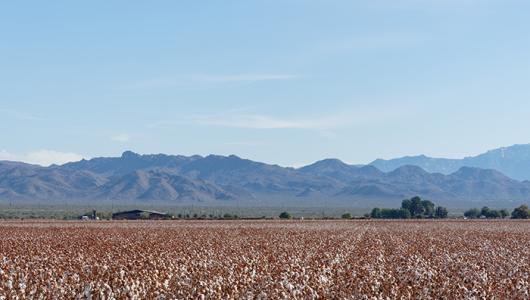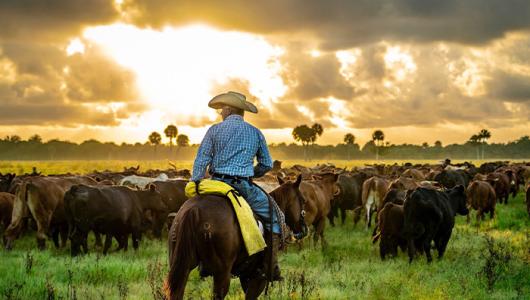This Friday meet Armondo White, a veteran and Black farmer in Marvell, Arkansas. Amidst the sprawling fields of the Delta, Armondo works with his wife, Andrea, and their two daughters, Madam and Ava, to combat food insecurity by bringing fresh, healthy produce to their community.

Growing to Give it Away
Farming has always been in Armondo’s DNA. His father and grandfather were sharecroppers. Growing up, Armondo and his family spent long hours tending to and harvesting crops—just so they could give them away to their neighbors.
“I didn’t understand at the time why we were working so hard just to give all that food away. But that’s the most important thing my father taught me: selfless love for my community,” Armondo explains. “Now, I have this desire to be able to offer everyone access to fresh fruits and vegetables.”
This desire remained dormant until Armondo’s service with the U.S. Army in Iraq from 2004 to 2005. Witnessing hunger and scarcity sparked a fire within him, especially once he realized that hunger was not a distant issue. He’d seen it back home. Then the COVID-19 pandemic hit, underscoring our food system’s fragility.
“I asked myself what would happen if the grocery stores shut down while I had a family to feed. It was a huge eye-opener.”

Shifting Perspective
Armondo’s perspective shifted from farming as an extracurricular activity to a full-time job. Realizing he could grow more than enough food for his family, he began cultivating for the wider community too, recognizing the need to address food disparities especially within Black communities.
Armondo grows a variety of produce, including cantaloupe, cucumbers, tomatoes, peppers, watermelon, salad greens, and okra, and he raises chicken, fish, lamb, and cows. He carted along his fresh fruits and vegetables and offered them to people when he’d deliver newspapers, with many customers offering to pay what they could for the produce.
“I wanted to purchase a mobile food trailer and offer 'take what you need, give what you want' days to help [provide access] to high quality, fresh, affordable organic vegetables,” Armondo said. By fostering a culture of mutual support, he's helping create a network of neighbors who look out for each other.

But he says he can’t do it alone. With the guidance and support of NRCS staff at the USDA Field Service Center in Phillips County, Armondo’s farming aspirations have taken root. Armondo has obtained a hoop house, farm well, pumping plant, micro-irrigation pipeline, and synthetic mulch. Through his Conservation Stewardship Program (CSP) Urban, Environmental Quality Incentives Program (EQIP), and Regional Conservation Partnership Program (RCPP) contracts, Armondo can make his vision for his family’s farm a reality.
“[The] Natural Resources Conservation Service has been a lifeline as far as the resources and support their people have provided us in the last few years,” Armondo explains. “I’m grateful for NRCS helping people like me and my family that are striving to help out the rest of their community.”
Armondo also wants other producers to know that USDA can help them. When a couple recently shared their troubles with their outdoor garden due to crop overspray, he advised them to contact the local USDA Service Center office in Helena-West Helena for help.

“About a week later while I was visiting the office, I saw them there completing their paperwork for a [high] tunnel house,” he said. “I was overjoyed to know that they had followed up on the advice and hopeful [that they are] on the road to having a successful year.”
Armondo’s commitment extends beyond providing fresh produce. He believes in teaching the value of connecting with others.
“I feel an obligation to Black communities and younger generations to put the ‘neighborly’ part back into the meaning of the word ‘neighborhood’,” he said. “If I don’t set a good example by reaching out to others, who will? I’m just doing what I believe we were all put on this earth to do—and that’s to help one another.”
More Information
Visit local farms, ranches, forests, and resource areas through our Fridays on the Farm stories. Meet farmers, producers and landowners who are working to improve their operations with USDA programs.
USDA offers a variety of risk management, disaster assistance, loan, and conservation programs to help producers weather ups and downs in the market and recover from natural disasters as well as invest in improvements to their operations. Learn about additional programs.
For more information about USDA programs and services, contact your local USDA service center.
Claire Kausch is a public affairs specialist for NRCS in Arkansas


